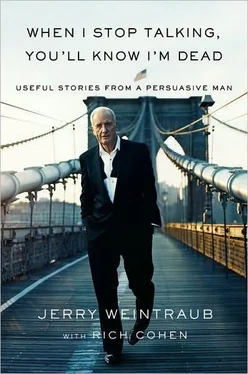The Producer
J ust what does a movie producer do?
It's a question I hear all the time.
Well, simply put, the producer is a driving force behind the project. It's often the producer who finds the story, the article that reads like a movie, the novel that cries out to be filmed, the event you just know will light up the screen. He tracks down the author or owner or real-life players, secures the rights-at favorable terms-hires a writer to turn the story into a script, which is key. I don't care what kind of cast you have, how beautifully the thing is shot-if you don't have the right script, you're going to fail. But with the right script, you can set yourself up with a studio, get a bucket of cash, hire a great director and actors, scout locations, and so forth. As the project proceeds, your job-one of them, anyway-is to police and guide everything, to be the adult, the voice of authority, the wallet when it's pay time, the hammer when it's hammer time. For this, you take some of the credit when it works, and most of the blame when it fails.
What qualifies a person to be a movie producer?
Another question I'm often asked.
Well, it's mostly a matter of temperament. You have to enjoy being in the world, mixing it up, reveling in hits and misses. A movie set is like Brigadoon, a city that appears on the sands and exists for just a time, with all the rivalries and passions of a metropolis. The producer is mayor of that city, shaking hands and walking streets, calling people to compromise, rise above, and, crucially, to work with people they do not like. You have to praise and you have to scold. It must have been easier in the old days, of course, when the actors were on contract and thus were simply told: Go there, play that. But every player is now a free agent, meaning everyone is a star and expects to get paid like a star, or at least a little bit more than anyone else is getting paid.
This dynamic-everyone measuring himself or herself against everyone else-has just about killed the ensemble picture. The Wild Bunch, The Dirty Dozen, The Magnificent Seven-you hardly ever see movies like that anymore. It's become nearly impossible to produce a film with more than three major stars. It's less about money than about politics. People talk on the set, and when they talk, they compare, and when they compare, they bitch. Some demand raises or back-end points, others simply storm off. Which is why I consider the Ocean's movies such a triumph. Merely being able to assemble such a cast-Clooney, Pitt, Damon, Gould, Garcia, Cheadle, and so on-and keep it together through three pictures was a feat. My role in this was both as hands-on tactician and as guiding spirit. I was the old man upstairs, saying, "Isn't this fantastic! Can you believe all of the fun we're having?"
But the main job of the producer is this: Solve problems. The list of my movies is, in fact, little more than a list of problems solved. The pit boss won't let us shoot in the casino? Fine! Build a casino in Burbank. Each movie tells the story of its producer, where the idea came from, and how the crises were averted.
Take, for example, Oh, God!, which I produced after Nashville. It was a breakthrough for me. With it, I finally reached the great American middle that Colonel Tom Parker talked about so often. The idea came from David Geffen, who acquired the rights to the novel and wanted to cast John Denver as the lead, a befuddled, latter-day Abraham, who, while managing a supermarket in California, hears the voice of God. It was a perfect part for John and a great way for him to branch out into something new, the average lifespan of a pop star being not much longer than the average career of an NFL running back. Geffen asked me to produce. Larry Gelbart and Carl Reiner were already assigned to write and direct. You could do no better. Gelbart was the author of A Funny Thing Happened on the Way to the Forum. Carl Reiner was the creator of The Dick Van Dyke Show. The men worked together on Sid Caesar's Your Show of Shows. Alan Arkin had been signed to play God, which made sense. Not only is Arkin a great actor, he was friends with Reiner and Gelbart. He was young, though, a little slight for the part of Yahweh. I mean, when you think of God, what do you picture? For me, it's a gray-haired, humorous old Jew, with slumped shoulders and big hands and a cigar in his mouth.
After discussions of a theological nature-What kind of voice do you think the big guy would have? Do you think the divine would take his own name in vain?-Reiner and Gelbart and I realized we were all picturing the same face.
All three of us decided the only person for this part was George Burns.
Burns was in his late seventies, a legend with a career that went clear back to the golden age of radio and, before that, to the Yiddish theater. He was a vision of the almighty in modest, human form. He was available, but the situation was tricky. It meant firing Arkin, who was friends with everyone. But when we explained it to him, he understood. The part of God was not one you could use the Method to play-you could not draw on your own experience to get into the mind of the Infinite. You simply had to be an old man who had been around forever, had done everything, had known everyone.
It all came back around years later, when I was casting Ocean's Eleven. I signed Arkin to play the part of Saul, who was just the kind of wise, humorous old man Burns would have played a generation before. Two days before shooting, I got a call. Arkin was going in for surgery and would miss the shoot. I was in a panic. I went over to Carl Reiner's house in the middle of the night, banged on the door, handed him the script, and said, "Please, Carl, you have to play the part of Saul in Ocean's Eleven."
He said, "Jerry, Jerry, why so late?"
"Well," I told him, "Arkin was supposed to do it, but he's in the hospital."
"Oh, I see," said Carl, "Alan is still not ready to play God."
The table read of Oh, God! is still vivid in my mind. This is the first real rehearsal: The producer and director and writer sit around as the actors go through the entire script, playing their parts for the first time. It's early in the process, but usually, from how the actors work together and react, you can get a sense of how the movie will play. George Burns entered in that slow, shuffling way of his-every step made me laugh. He was seventy-nine, impossibly old. Who knew he would live another twenty years? His face was like parchment. His eyes were warm and dark. He wore an obvious toupee-it was the one off note. He was a great performer. Everyone stood when he came in. For the actors, reading with him was like taking batting practice with Babe Ruth. But he was an old man, so you could not help but wonder how he would handle his lines. When we started reading, though, it was obvious he knew not only his part, but every part in the script. If John Denver fumbled, George Burns would correct him. He was incredible. Before the read, he talked with Gelbart and Reiner and Avery Corman, who wrote the novel. He went through the script with a pen, explaining which lines would hit and which would bomb, which would get big laughs and which would get embarrassed snickers. "You will kill with this one," he said, "but with this one, you'll wonder if you picked the wrong profession."
Making the movie was a dream. The only issue, really, was George's hair, or, to be specific, fake hair. Simply put, he would not take off his toupee. We begged, please, for this role, ditch it. He refused. It was a question for priests and rabbis. Would the Lord of Hosts wear a piece? To me, the answer was obvious. Even if God is bald, or has a bald spot, and even if this makes him self-conscious when he walks upon the earth, don't you think that, rather than getting a rug, he would just make new hair? I mean, if he could part the waters…? But Burns refused, which meant a movie in which God would wear a rug. No good. As I said, the job of the producer is to solve problems. I therefore decreed: The Lord will wear a hat! If you watch the movie, you will see that God is pictured, variously, in a baseball hat, a cowboy hat, a captain's hat. He is a man of many moods and many seasons.
Читать дальше

![Сьюзан Кейн - Quiet [The Power of Introverts in a World That Can't Stop Talking]](/books/33084/syuzan-kejn-quiet-the-power-of-introverts-in-a-wo-thumb.webp)










